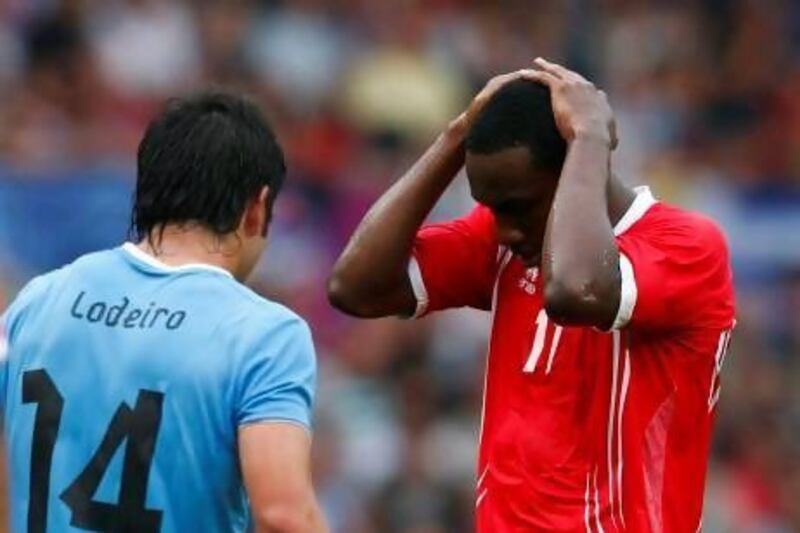Ahmed Khalil was born in 1991, or two years later than the majority of the players in the UAE Olympic football team at the London 2012 Games. Despite his youth he has been the primary supplier of goals for the country's prize age-group side since 2009.
He produced two match-winning goals for a UAE team that reached the quarter-finals at the Under 20 World Cup in 2009, when he was just 18.
He scored five of the six goals tallied by the eventual champions at the 2010 U23 Gulf Cup, when he was 19, and had three for the silver-medal U23 team in the 2010 Asian Games, six months before he had turned 20.
Mahdi Ali's Olympic team have other scorers, but none so prolific as the athletic Al Ahli striker, and the Emiratis will need him in his best form tomorrow night when they play Team Great Britain in a high-profile match at Wembley Stadium.
Khalil's performance in the UAE's 2-1 loss to Uruguay in the opening match of Group A can safely be described as disappointing. He failed to test the goalkeeper on two occasions when presented with a sight on goal, and he seemed extremely uncomfortable on the ball; he was often dispossessed.
His second miss, a short shot that rolled wide in the 77th minute, elicited a groan from 70,000 supporters in Old Trafford, and saw Khalil bury his face in his hands, and not for the first time.
It might have been an unlucky 90 minutes, but it also could suggest that the prodigy, who scored his first Ahli goal when he was 16, has failed to polish his game in recent years. Dave Fenwick, who is a Dubai-based representative for the Triple S Sports agency, believes that.
"Ahmed has the physique to play in the Premier League or Bundesliga. No doubt about it," Fenwick says. "But he should have gone to Europe two years ago, and now his game has gone backwards."
He noted the lack of time Khalil had with his club side during the 2011/12 season. The Emirati was in the first XI for Ahli only seven times in the Pro League, coming on as a substitute five times. He scored two goals; in 2009/10 he struck 11.
To be sure, Khalil missed significant club time because of commitments to both the senior national team, for whom he first scored when he was 18, and the Olympic team. But there were periods, especially in the spring, when he was with Ahli but was used sparingly by Quique Sanchez Flores, the Dubai club's Spanish coach, and it alarmed Mahdi Ali.
"He has to play to improve his level and keep his sense of scoring, because if a striker doesn't play games he loses his sense of scoring, and this will make it more difficult for us," said Mahdi Ali.
Khalil scored a team-best four goals during the seven friendlies played by the Olympic team in their long training camp ahead of the London Games, but even then he was most effective when he fired off shots after one or perhaps two touches, leaving observers searching their memories to recall whether holding the ball up for teammates has been an issue for him all along or whether it is becoming apparent as the UAE play stronger opponents.
With the goal in sight, Khalil is a deadly threat. He is effective on free kicks, is dangerous in the air and can score from distance if given a crack of light, as he showed with two powerful goals in the Olympics-clinching victory at Uzbekistan.
An issue also at play here is that the UAE have no one else like Khalil, a well-muscled man who stands 1.78 metres and has excellent speed and a powerful shot.
The other forwards in the side, Ismail Matar and Ahmed Ali, and even Omar Abdulrahman, if he assumes a withdrawn attacking position, are not tall men likely to pose a threat on set pieces simply by their presence inside the box.
Ismail Al Mas and Khalid Alwari, former teammates of Mahdi Ali at Ahli who attended the Uruguay match on Thursday, questioned Khalil's tactical savvy. They were adamant that he should have gone to ground immediately after he was jostled in the penalty area by the robust Uruguay defenders in the first half.
"Instead, he stayed on his feet, making it easy for the referee not to call a penalty," Alwari said.
Khalil's game can be dissected; anyone's can be. At the end of the day, the UAE's goals are most likely to come from him. Emiratis will be hoping he can find the target at Wembley tonight, and help ensure their game with Senegal on Wednesday is meaningful.
[ poberjuerge@thenational.ae ]
Follow us
[ @SprtNationalUAE ]
and Paul Oberjuerge
[ @pauloberjuerge ]





